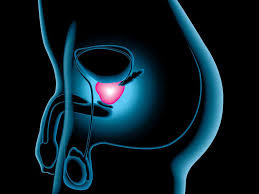The prostate is a small gland about the size of a walnut. It is located below the bladder and surrounds the upper part of the urethra – the tube that carries urine and semen through the penis. The prostate gland produces a thick clear fluid that mixes with spermatozoon to form semen.
With age, a man’s prostate can grow in size, without being something abnormal, tough sometimes, it may cause a block of urine flow. So, there are some problems with the prostate that can affect men, especially those aged over 40 years:
Benign prostatic hyperplasia – the urinary flow is restricted and therefore there will be the need to urinate more often, especially at night;
Acute and chronic prostatitis – the prostate gland becomes inflamed. It is estimated that 35% of men may face chronic prostatitis during their life, and the symptoms that manifest are frequent urination and pain, decreased libido or erectile failure;
Prostate cancer – it affects the cells of the prostate gland and can block the flow of urine. It is necessary to be early detected and treated to prevent the expansion of cancer cells to other parts of the body.
Men over 50 years have to take annual tests
To prevent prostate cancer, every man should be aware of the need to annually consult a urologist, especially if there have been such cases in the family. This is the only way for the affection to be detected early and treated appropriately.
What symptoms should I worry about?
Usually, in case of prostate, there are some symptoms that can alert you and “ask” for a medical examination. The most common symptoms reported by men are difficulty or pain during urination, frequent urination – especially at night – feeling of an impending urination, which can not be postponed, blood or semen in urine, impotence.
The medical exam:
The physical examination should include digital rectal examination, ultrasound prostate imaging (involves placing a probe the size of a finger into the rectum and is based on ultrasound), a blood test for identifying the prostate-specific antigen (PSA). Elevated PSA levels may indicate prostate cancer, but there is a possibility that the PSA levels to be increased due to other diseases.
During the digital rectal exam, the urologist will examine your prostate considering tougher or abnormal areas in the prostate.
Radioactive implant therapy: an alternative to prostatectomy
After diagnosis, the doctor will prescribe the appropriate treatment, either medical or surgical. Prostatectomy (surgical resection of the prostate) is frequently associated with radiotherapy, which is exposing the affected person to a high risk of impotence and urinary incontinence. Therefore, treatment with radioactive seeds is considered an alternative for this treatment. However, this treatment is not for all patients, only those with the disease discovered in early stages can benefit from it.
Pay attention to your diet!
Experts at the American Institute for Cancer Research estimates that over 30% of all cancers are related to mistakes we make in our diet. So, diet plays a key role in preventing prostate cancer.
Some simple steps that can help in preventing cancer:
Do not overdo with food. It is recommended a medium serving dish for each meal to keep weight under control;
Avoid foods high in fat. The number of cancer cases varies from country to country, but there was an increase of the disease in populations that consume too much fat. A diet abundant in saturated fats (fats from red meat: beef, lamb, mutton) is the most dangerous and can accelerate cancer;
– You have to make the healthiest choices: whole grains, brown rice, wholemeal bread while limiting intake of sweets and salt;
– Alcohol should be consumed in moderation. In general, “moderate” means no more than 2 drinks a day for men;
– Eat vegetables and fruits. All studies have shown that fruits and vegetables eaten regularly reduces the risk of cancer;
– Omega 3 fatty acids are essential. Find them in cold water fish: salmon, mackerel and herring. It reduces the risk of developing certain cancers.
– Selenium and vitamin E: Some researchers claim that selenium and vitamin E administered daily can prevent the development of prostate cancer.


